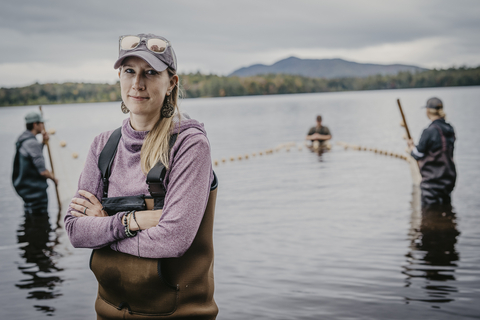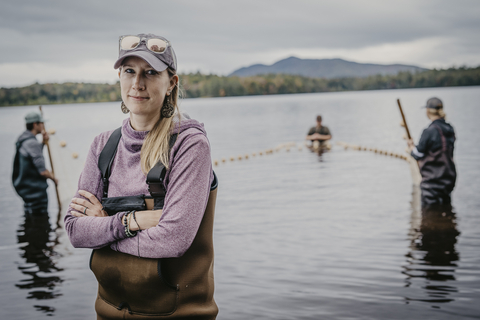PAUL SMITHS, N.Y.--(BUSINESS WIRE)--Following Dan Kelting’s appointment as its president, Paul Smith’s College today announced its rebranding efforts, spearheaded by its unique focus on climate and environmental justice education, greater external engagement for students and faculty, and intentionality with making the outdoors a place for everyone.
Paul Smith’s College’s rebrand comes as college enrollment rates across the country continue to decline — a threat to institutions everywhere. In fact, the number of high school seniors entering college for the first time could see a 9% decrease by 2029. In an era of uncertainty for higher education, Paul Smith's College is taking a bold stance by embracing what makes it truly unique: Its unparalleled location, innovative and climate-informed programs, and commitment to real-world, hands-on learning — a strategy that has paid off.
The college brought total enrollment to nearly 600 students this year, which represents a year-over-year rebound and marks an impressive recovery after weathering declines in 2023 and 2022. Additionally, first time full-time retention is 76%, the highest it has been in more than 20 years.
“Like many small colleges with modest endowments, Paul Smith’s faces significant challenges. But rather than cutting back on the programs that make us unique, we’re doubling down on them,” said Kelting. “As the only four-year college in the Adirondacks, we’re proud to be known as ‘The College of the Adirondacks,’ a leader in climate education and a vital economic engine. Just as importantly, we’re ‘The College for the Adirondacks’ — deeply committed to engaging with our community and strengthening the local economy. We are ‘The College That Works’ — focused on accessibility, preparing students for work-ready careers, and building a sustainable future.”
The college took a three-pronged approach to achieve its rebrand efforts:
Hone in on climate and environmental justice offerings
Climate and environmental justice education was a key focus of the rebrand. With a 14,000-acre campus — one of the largest in the nation — Paul Smith’s College has always been about the experience, where the best thinking happens outdoors. In fact, the college was originally the first wilderness resort in the Adirondacks. Every program, from forestry to culinary arts and hospitality, integrates climate awareness, leveraging the college’s natural surroundings and commitment to sustainability.
Leaning into climate and environmental justice was key in order to appeal to incoming Gen Z students, as 61% want to get a green job within the next five years. Whether students are studying farm-to-table culinary practices, managing natural resources, or leading outdoor recreation, climate-informed education is central to the experience at Paul Smith’s College.
Students at Paul Smith's College have the opportunity to engage in distinctive experiential learning programs. These include forestry students converting fresh timber into finished boards at the nation's only student-run sawmill, collecting sediment cores from nearby Lower St. Regis Lake to far-reaching locations like Kenya and Peru, and mastering the process of tapping, boiling, and crafting syrup and maple products on campus from start to finish.
Ramp up external engagement
Increased external engagement was also critical to the rebrand. As a small college, continuing to connect with and demonstrate value to the Adirondack community was imperative. This included students working off-campus in their professional fields and faculty collaborating with the community.
To enhance engagement, the college leveraged the success of its Adirondack Watershed Institute to launch a forestry institute, as well as emerging institutes in disciplines like culinary arts, hospitality, and climate and environmental justice. This aligned with the college’s mission to prepare students for impactful careers that address the region’s and the world’s most pressing challenges.
Establish the outdoors as a place for everyone
The last piece of the rebrand puzzle was to ensure Paul Smith’s College was a place where every student who wanted to attend could see themselves. This was especially important since 80% of new students have a demonstrated interest in the outdoors, reflecting Paul Smith’s College’s deep connection to its surrounding environment.
The college’s nationally recognized athletes in timber sports, Nordic skiing, snowshoeing, and marathon canoeing — students can even canoe/kayak from campus to the Statue of Liberty — further highlight the college’s connection to the natural world and commitment to excellence in all areas. And with 99% of students receiving scholarships, grants, and other financial assistance, Paul Smith’s College ensures no one is left out.
“Our rebrand coincides with other recent improvements we’ve made, including launching a new website, leveraging cutting edge technology to create financial aid videos, and working with new strategic partners, such as Bospar, CCA, Fastspot, Encoura, RootedRock, and Ruffalo Noel-Levitz,” said Kathy Bonavist, Executive Vice President Advancement and Enrollment at Paul Smith’s College. “We’ve stabilized our enrollment rates and tripled completed applications, and, with these improvements, we’ll continue to keep the momentum going.”
To learn more information about Paul Smith’s College, please visit paulsmiths.edu.
About Paul Smith’s College:
At Paul Smith’s College, it’s about the experience. As the only four-year college located in the Adirondack Park in upstate New York, Paul Smith’s provides real-world, hands-on learning in fields such as business and hospitality, culinary management, forestry, environmental sciences and natural resources. We are able to draw on industries and resources available in our own backyard while preparing students for successful careers anywhere. Our community of resourceful, enterprising, supportive and adventurous individuals collectively provide experiential education, student support in the classroom and beyond, and meaningful opportunities for our alumni. We pride ourselves on research and advocacy on issues that improve our planet and the lives of the people who inhabit it. Learn more at paulsmiths.edu.




